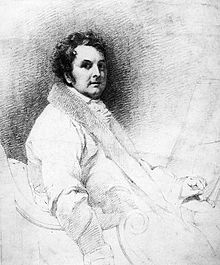Joseph Michael Gandy
| Joseph Gandy | |
|---|---|

Sketch of Joseph Gandy by Henry William Pickersgill, 1822.
|
|
| Born | 1771 London |
| Died | 25 December 1843 Devon |
| Nationality | English |
| Known for | Painting |
| Patron(s) | Sir John Soane |
Joseph Michael Gandy ARA (1771–1843) was an English artist, visionary architect and architectural theorist, most noted for his imaginative paintings depicting Sir John Soane's architectural designs. He worked extensively with Soane both as draughtsman and creative partner from 1798 until 1809 when he (ultimately unsuccessfully) set up his own practice.
Joseph Gandy was the son of Thomas Gandy (1744–1814) and Sophia née Adams (1743–1818). He was the brother of the architects Michael Gandy (1778–1862) and John Peter Gandy, later Deering (1787–1850).
He married, in 1801, Eleanor Susannah Baptist née Webb (1773–1867), daughter of Thomas Webb and Catherine née Wiggington. Among their children: Mary Gandy (1810 –1888) married Francis Impey (1812–?) attorney, son of Vice Admiral John Impey RN (1772–1858); and Thomas Gandy (1807–1877), portrait painter, married Catherine née Hyde (1811–1889), they were great grandparents of Robin Oliver Gandy (1919–1995).
Gandy built little in his career, having a reputation as a difficult individual to deal with. However his work included the Phoenix Fire and Pelican Life Insurance Offices (1804–1805, destroyed c. 1920) in London, Doric House at Sion Hill in Bath (1818), and the remodelling of Swerford Park house in Oxfordshire (1824–1829). Commercially he was a failure and served two terms in a debtors' prison, but his published and exhibited work was largely a critical and popular success. In 1821 he published two articles in the Magazine of Fine Arts on The Philosophy of Architecture. He intended to expand upon this subject in an eight-volume work entitled Art, Philosophy and Science of Architecture, of which his unpublished manuscript survives.
His paintings show a dramatic use of two-point perspective and architectural precision, and also reflect his (and Soane's) fascination with Roman ruins. His architectural fantasies owe a clear debt to Piranesi and play upon historical, literary and mythological themes with a feeling for the sublime that is the equal of his contemporaries J. M. W. Turner and John Martin.
...
Wikipedia
